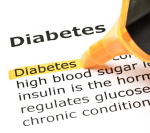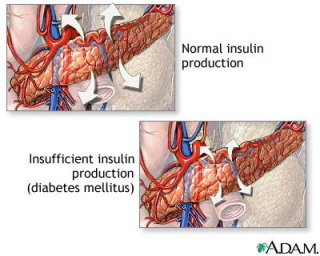
A • B • C • D • E • F • G • H • I • J • K
L • M • N • O • P • Q • R • S • T
U • V • W • X • Y • Z
Medical Tests
Definitions
T1: Type 1 diabetes.
T2: Type 2 diabetes.
Triglyceride (TRI): The most common form of fat stored in the body. High triglyceride (hypertriglyceridemia) levels may occur when diabetes is out of control. High levels of triglycerides are associated with an increase risk of heart disease.
Body fat is almost entirely made up of triglycerides, and fats are mostly transported in the blood in this form as well. Triglycerides can come directly from dietary fat , or from fat converted from carbohydrates. This is one reason why people who follow low carb diets (and eat mostly protein) rarely have triglycerides above normal (150 mg/dL). This is one of the most reliable results of following a low carb way of eating.
Type 1 Diabetes: Type 1 diabetes occurs when the body can no longer make insulin on its own. Type 1 diabetes can result from hereditary deficiencies in the beta cells of the pancreas (maturity onset diabetes of the young, or MODY), damage to the pancreas from trauma or drugs, another illness like hemochromatosis (iron overload) or cystic fibrosis that damages the pancreas, or will result when the pancreas is surgically removed.
The most commonly diagnosed form of type 1 diabetes is juvenile diabetes, or, insulin-dependent diabetes. People with juvenile type 1 diabetes have an inherited genetic predisposition towards developing diabetes (the genes are different for type 1 and type 2 but both have a genetic aspect involved). Many people carry these genes but will never develop the disease. For those that do become diabetic, something triggers the body to attack and destroy the insulin producing beta cells in the pancreas.
Type 2 Diabetes: Type 2 diabetes occurs when the insulin-producing beta cells in the pancreas either do not make enough insulin, or, the person with type 2 diabetes is not sensitive to the insulin produced (insulin resistant).
Over time, the pancreas may wear out and stop producing insulin altogether. If this occurs, a person with insulin dependent type 2 diabetes be required to inject insulin each day to live.



